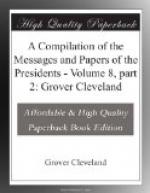The remaining words, “regulate, limit, and suspend,” first appear in the American draft. When it was submitted to the Chinese, they said:
We infer that of the phrases regulate, limit, suspend, or prohibit, the first is a general expression referring to the others. * * * We are entirely ready to negotiate with your excellencies to the end that a limitation either in point of time or of numbers may be fixed upon the emigration of Chinese laborers to the United States.
At a subsequent interview they said that “by limitation in number they meant, for example, that the United States, having, as they supposed, a record of the number of immigrants in each year, as well as the total number of Chinese now there, that no more should be allowed to go in any one year in future than either the greatest number which had gone in any year in the past, or that the total number should never be allowed to exceed the number now there. As to limitation of time they meant, for example, that Chinese should be allowed to go in alternate years, or every third year, or, for example, that they should not be allowed to go for two, three, or five years.”
At a subsequent conference the Americans said:
The Chinese commissioners have in their project explicitly recognized the right of the United States to use some discretion, and have proposed a limitation as to time and number. This is the right to regulate, limit, or suspend.
In one of the conferences the Chinese asked the Americans whether they could give them any idea of the laws which would be passed to carry the powers into execution. The Americans answered that this could hardly be done; that the United States Government might never deem it necessary to exercise this power. It would depend upon circumstances. If Chinese immigration concentrated in cities where it threatened public order, or if it confined itself to localities where it was an injury to the interests of the American people, the Government of the United States would undoubtedly take steps to prevent such accumulations of Chinese. If, on the contrary, there was no large immigration, or if there were sections of the country where such immigration was clearly beneficial, then the legislation of the United States under this power would be adapted to such circumstances. For example, there might be a demand for Chinese labor in the South and a surplus of such labor in California, and Congress might legislate in accordance with these facts. In general the legislation would be in view of and depend upon the circumstances of the situation at the moment such legislation became necessary. The Chinese commissioners said this explanation was satisfactory; that they had not intended to ask for a draft of any special act, but for some general idea how the power would be exercised. What had just been said gave them the explanation which they wanted.
With this entire accord as to the meaning of the words they were about to employ and the object of the legislation which might be had in consequence, the parties signed the treaty, in Article I of which—




